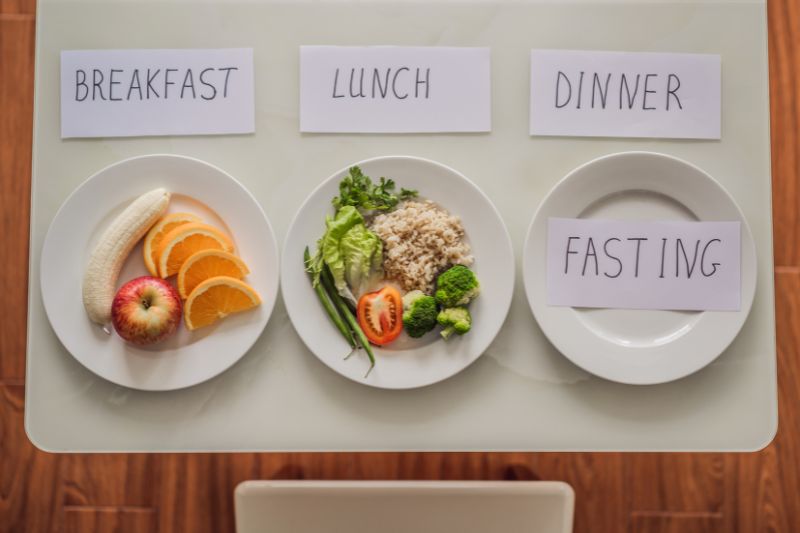
Intermittent fasting is a popular dietary approach that involves cycling between periods of eating and periods of abstaining from food. It is not a diet in the traditional sense, as it does not specify which foods to eat, but rather when to eat them.
Many people turn to intermittent fasting as a way to lose weight, improve their overall health, and increase their mental clarity and focus. If you are interested in how to start intermittent fasting, here are some tips to get you started:
Choose a fasting schedule that fits your lifestyle:
There are many different intermittent fasting schedules to choose from, and the best one for you will depend on your individual goals and lifestyle. Some popular options include the 16/8 method, the 5:2 diet, and the Eat-Stop-Eat method. The 16/8 method involves a 16-hour period of fasting followed by an 8-hour window for eating.
For example, you might skip breakfast and only eat during the hours of noon to 8pm. The 5:2 diet involves eating normally for 5 days of the week and restricting calories to 500-600 for the other 2 non-consecutive days. The Eat-Stop-Eat method involves one or two 24-hour periods of fasting per week. For example, you might abstain from food from dinner one day until dinner the next day.
Gradually adjust your eating patterns:
If you are used to eating three meals a day with snacks in between, it might be challenging to switch to a new eating pattern overnight. To make the transition easier, try gradually adjusting your eating patterns over the course of a week or two. For example, you might start by skipping breakfast one day a week, and then gradually increase the number of fasting days as you become more comfortable with the schedule.
It is also a good idea to start slowly when it comes to the length of your fasting periods. If you are new to intermittent fasting, you might want to start with shorter fasting periods and gradually work your way up to longer ones. This can help you to get used to the feeling of being hungry and help you to learn how to manage your cravings.
Eat nutrient-rich foods:
During the eating periods, it is important to focus on nutrient-rich, whole foods such as fruits, vegetables, whole grains, and lean proteins. These foods will help to fuel your body and keep you feeling satisfied. They are also rich in vitamins, minerals, and antioxidants, which are essential for overall health.
It is also a good idea to avoid processed foods, sugary drinks, and high-fat snacks, as they are low in nutrients and can contribute to weight gain. These types of foods can also make it more difficult to stick to your intermittent fasting schedule, as they are often high in calories and can cause blood sugar spikes and crashes.

Stay hydrated:
It is important to stay hydrated during your fasting periods by drinking plenty of water, calorie-free beverages, and herbal teas. This will help to keep your body functioning properly and keep you feeling energized. It is also a good idea to avoid alcohol and caffeine, as they can interfere with the benefits of intermittent fasting.
Alcohol can disrupt your sleep patterns and make it more difficult to stick to your fasting schedule, and caffeine can interfere with the natural hunger and fullness cues that your body uses to regulate food intake. By staying hydrated and avoiding these substances, you can help to set yourself up for success with your intermittent fasting journey.
Get enough sleep:
Getting enough sleep is important for overall health and can help to improve your ability to stick to your intermittent fasting schedule. Aim for 7-9 hours of sleep per night and try to maintain a consistent sleep schedule. This will help to keep your energy levels stable and improve your ability to focus and concentrate.
Lack of sleep can disrupt your appetite and make it more difficult to stick to your fasting schedule, so it is important to prioritize sleep when starting out with intermittent fasting. To improve your sleep quality, try to create a relaxing bedtime routine, avoid screens before bed, and keep your bedroom cool, dark, and quiet.
Don’t overdo it:
Intermittent fasting can be an effective tool for improving your overall health, but it is not a magic solution. It is important to remember that it is just one part of a healthy lifestyle, and it should be combined with a balanced diet and regular physical activity. If you have any underlying health conditions, or if you are pregnant or breastfeeding, it is important to consult with a healthcare professional before starting an intermittent fasting schedule.
Intermittent fasting is not suitable for everyone, and it is important to approach it with caution. If you are having trouble sticking to your fasting schedule or if you are experiencing negative side effects, it is important to consult with a healthcare professional to determine if intermittent fasting is the right approach for you.
In conclusion, starting intermittent fasting can be a simple and effective way to improve your overall health and achieve your weight loss goals. Learn more about intermittent fasting for men, or intermittent fasting for women.. by choosing a fasting schedule that fits your lifestyle, gradually adjusting your eating patterns, eating nutrient-rich foods, staying hydrated, getting enough sleep, and not overdoing it, you can set yourself up for success. Remember to always consult with a healthcare professional before starting any new dietary approach.




